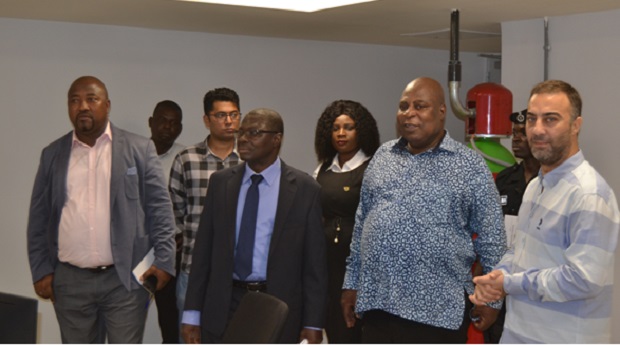Ishmael Ashitey and other officials inspecting the facilities
The $274 million Kotoka International Airport (KIA) expansion project, dubbed Terminal 3, will be handed over to its owners, Ghana Airports Company Limited (GACL) by the end of this month.
According to Okan Dogan, Project Manager of MAPA Ghana, the Turkish company constructing the ultramodern facility, the staff of the firm are testing the various equipment in the highly computerized edifice.
The Project Manager, who disclosed this to the Greater Accra Regional Minister, Ishmael Ashitey and his entourage during a day’s working visit to the Terminal 3 Site on Monday, opined that it would boost the country’s aviation industry.
The Regional Minister was accompanied on the tour by the Chief Director, Ernest Nyagbe, Assistant Director, Henry Asomah and other senior officials at the Greater Accra Regional Coordinating Council (RCC).
According to the Project Manager, the Terminal 3 project, which meets international standards, occupies a total land area of 150,000 meters square.
He averred that it boasts of six Passenger Baggage aero Bridges (PBB) and 56 check-In desks, and various sections at all its five levels.
“Terminal 3 project, which process 1,600 passengers per hour and five million passengers per year is bound to introduce fresh breeze of excitement to passengers travel experience while personnel deployed here will equally enjoy the use of sophisticated equipment to make their work equally pleasant,” he remarked.
Mr Ashitey paid glowing tribute to the Turkish Company for the timely completion of the project, which according to him, would boost tourism and investment flow, as well as facilitate inter regional trade and exchanges.
“Today, we can see the President’s vision to make Ghana the preferred destination of choice for the traveling public, and I am very confident the commissioning of this edifice very soon will not only ease congestion at the points of departure and arrival but will make travelling a pleasant experience,” he remarked.
The minister urged them to collaborate with the Metropolitan Municipal and District Assemblies (MMDAs) to execute other projects.
By Solomon Ofori


